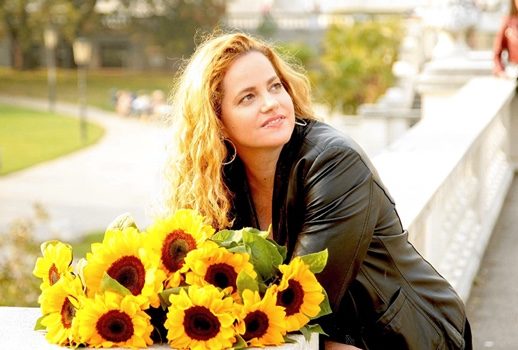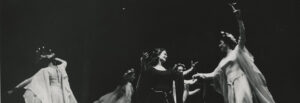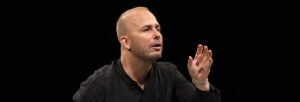
However, the power of this genre is amplified significantly when a gifted conductor contrasts these scores’ dramatic propulsion with beautifully judged balances and dynamics, vibrant orchestral colors, and musically revelatory tempi and phrasing. Whenever I visit recordings presided by superb musicians like Arturo Toscanini, Victor de Sabata, Claudio Abbado, Riccardo Muti or Giuseppe Sinopoli, I often find myself marveling at the incredible orchestration set by the great masters.
Under these conductors’ imaginative leadership, writing that is sometimes regarded as dramatic accompaniment for singers emerges as a symphonic model for how operatic instrumentation can be crafted intelligently and artfully about the vocal writing championed by Italian composers.
Speranza Scappucci, the musical director of the Opera Royal de Wallonie at Liege, is currently experiencing the early phase of a promising international career in music. Broadcasts with her conducting opera from various European houses impresses not only for the technical exactitude she consistently commands from her ensemble, but also for the more nebulous qualities of imagination, idiom, nuance and theatricality that belong to the most distinguished musical artists.
In this regard, I believe that Ms. Scappucci has the potential of joining the august company of great conductors who are paragons of this art form.
I first discovered Scappucci’s work through a broadcast of Verdi’s rarely produced Jérusalem, broadcast during the prima of the 2017 season at Liege. Prior to hearing her reading of the opera, my interactions with Jerusalem were largely facilitated by Fabio Luisi’s respectable recording on Philips.
Like many of the operas in that series (where Lamberto Gardelli conducts most of the operas), I found that Jérusalem to be a well-produced document of a work that while displaying several of the composer’s fascinating embryonic ideas, lacked the concision and expressive power of the idiom Verdi crystallized during his maturity.
Scappucci’s reading of this opera was different. Her interpretation of Jérusalem injected vitality and beauty into this work, highlighting both the elegance of this quasi grand operatic score and the dramatic propulsion one often finds in latter operas like Don Carlos.For me, it was utterly refreshing to hear an orchestral interpretation that found an ideal (or rather, what I regard as ideal) middle ground between that hybrid, Donizetti-esque/grand operatic sound world with the more Romantic, dramatic qualities of Verdi’s more mature compositions.
In following discussion she graciously granted for parterre box, one can learn so much about a musician who shows the greatest love for this music, who understands the fine art of balancing the human voice with instrumentation in the confines of a musical drama, and who has demonstrated herself to be a most insightful artist in her blossoming conducting career.
I hope that you enjoy this interview, and that this inspires you to discover more about Ms. Scappucci and her musical artistry.
httpvh://youtu.be/t36VfF8D1IA
Christian Ocier: Much of your earlier musical life focused on piano and chamber music performance, but you mentioned that you stumbled on the art of opera coaching during your time at Juilliard. Can you elaborate more on how you honed your craft as maestro concertatore? For instance: how did you help singers develop their musical lines, linguistic nuances and phrases? How did you draw out the orchestral harmonies, colors, and dynamic nuances from a piano score and reflect that to the singers?
Speranza Scappucci: I grew up in Italy in a very music friendly household. My parents love music and therefore all their children tried an instrument at some point. They tried to bring us to concerts, and I saw my first opera at the age of seven or eight at the Teatro dell Opera di Roma.
My dad is a huge opera connoisseur, so opera was always playing on the radio. When I was at Juilliard I studied piano solo, but also did a lot of chamber music. And after getting my degree in piano solo performance I auditioned for the Collaborative Piano Masters in Music. During those years I started playing for and with singers, both Lieder rep and opera.
Because of my language skills I soon became very passionate about the relationship between text and music which is essential to opera. Many singer friends at Juilliard asked me to help them and that’s how I decided I wanted to become a great opera coach! I also took advantage of the fact that at Juilliard I could play for voice lessons.
I learned about breath, support etc. and the whole thing fascinated me so much because opera is the perfect combination of so many art forms. I took a class called Opera Performance Technique with the great Diane Richardson. She taught us how to reproduce on the piano sounds of orchestral instruments.
httpvh://youtu.be/1HTlxXhR5xg
CO: As a professional repetiteur, you had spent many years in opera houses and festivals assisting many of our important conductors. Can you tell me about the mentors who most greatly influenced your technical and artistic philosophies? What specific skills did you absorb that differentiate you from conductors who largely made their careers in symphonic music?
Secondly, does conducting purely instrumental music complement or enhance your work as an opera conductor, and vice versa?
SS: All my teachers in Rome and at Juilliard of course have been mentors. While working around the world in theaters and festivals I learned a bit from everyone. I remember being particularly fascinated by the way William Christie or Emmanuelle Haïm worked on a Handel score at Glyndebourne, because I didn’t know much about that rep.
At the Met I was lucky to work once with Levine and in Vienna with Mehta and Ozawa. From each one of them I learned something. But the Maestro I most followed and worked with (total of nine years) is Riccardo Muti, a giant of music. I learned so much from just being at his side at the piano, watching him deal with the way an opera or a symphony is constructed.
Even if I never took an official “lesson” from him in terms of technique or how to move my arms in front of an orchestra, I think that the biggest school was for me to be his music collaborator for so many years. The rigor and respect for the composer’s intentions, the research of some kind of meaning behind every word in connection with the music. It’s something I had already developed before meeting him, but that I was lucky to be able to further explore working by his side.
With symphonic music, it goes both ways. One complements the other. I think that it’s harder for someone that comes only from the symphonic world to conduct opera (if they know little about singing and breathing etc.) that the other way around. Conducting well opera (which doesn’t mean accompanying well the singers but building the whole musical structure) is very difficult and requires many skills. The symphonic world is different and also very challenging but in a different way.
CO: Of the operas that you helped prepare during your time as maestro concertatore, which one (or ones) gave you the strongest indication that becoming a conductor of opera was your calling? I would love to hear a few stories about your favorite operas from that period.
SS: There were many of course, not just one. Preparing Verdi operas with Muti was certainly something that inspired me. Macbeth and Attila in particular.
CO: Let us pivot to some of the major milestones of your career. You opened your inaugural season as principal conductor of the Opera Royal de Wallonie with Verdi’s rarely produced Jérusalem. It’s fascinating because I find that Verdi’s French grand opera reworking of I Lombardi uses a more refined orchestral palette. Apart from Fabio Luisi’s recording, it’s work that is largely unfamiliar to me. Can you talk more about this opera and the elements that draw you to it?
SS: I immediately accepted the offer of Liege’s intendant Stefano Mazzoni to conduct Jérusalem. For two reasons. The first was that I love Verdi and early Verdi has always fascinated me for its patriotic value. It’s music that looks simple on the page and instead it’s one of the most complicated and beautiful music to bring to life.
But you need to know how to read the signs on the page, how to create different palettes of sounds and really explain to coro, soloists and orchestra the meaning of a legato and a staccato, etc. The second reason was that Jérusalem is a masterpiece!
And it’s not entirely true that its the French version of I Lombardi. It’s a quasi completely redone, rewritten piece of music. Entire sections are new, the colors, the orchestration and even the characters are not the same. Plus, there is a long ballet. Of course it was also the occasion for me to make my mark, because we did the opera completely uncut (except very little cuts in some of the ballet music that repeated itself)
Very soon a DVD of that production will come out and I am proud that we did it in the theater where, after the success of that show, I became Music Director.
CO: Can you provide insights regarding how Verdi wrote music and phrases differently for his French language works like Jérusalem and Les Vêpres Siciliennes? Do you perceive any unique characteristics to these operas that differentiate them from his Italian ones?
SS: The biggest difference is that the languages are different, they have different inflections, different stresses. Therefore, inevitably the language influences the music line. We should never forget that the words also create music sounds, therefore the same melody with different consonants or vowels assumes a different color.
CO: Italian opera appears to be the cornerstone of your repertory. You gave your first performances in prestigious institutions like the Wiener Staatsoper and the Liceu with works like Don Pasquale and Attila, and you will be making your house debut this coming autumn in Paris with Rigoletto. You will also undertake your first Trittico in Tokyo.
I’d like to talk to you about how you determine the works that make up your career. For instance, Abbado greatly championed many operas by Rossini and Verdi, but paid little attention to other major Italian composers. Muti traversed a significant fraction of Verdi’s work, and occasionally visited later operas by Puccini, Mascagni, and Boito. Is there a compositional aesthetic or a style in opera that attracts you most when building your repertory?
SS: I am finding my way as I go. Of course, I started with Italian opera, But I have conducted a lot of French music too. In the symphonic repertoire I do a bit of everything. This year I will be doing my first Four Last Songs by Richard Strauss and quite a bit of Schubert, Strauss, Dvorak and Schumann.
Of course I love all the bel canto and Verdi, but I am finding that I have a very special connection to Puccini. And I try to be true to Puccini, the same I try with Verdi. Puccini is very specific about the way he writes music. And the drama is all there within the notes.
There is no such thing in Puccini as, for example, accompanying the singers. You support them, you help them , you breath with them, but the structure is very clear and the vocal line is actually very much intertwined with the orchestra. It’s all one thing. Puccini’s music goes direct to the heart and the soul, but we don’t need to over sugar it because it’s actually all there already! I love all of his operas and my dream is to conduct everything he wrote. This year after Butterfly and Trittico I will have arrived half way through!
CO: In his great biography on Toscanini, Harvey Sachs wrote that the great conductor was once advised by Verdi to change his concept of a piano dynamic marking written in Otello, and that such markings in Italian opera are conceptually different from symphonic scores by the likes of Schubert and Beethoven.
I’m curious about this remark: how does a conductor and orchestra optimally shape a cantabile line, or how orchestral parts are balanced in Italian opera? Of course, this could vary from periods like the bel canto era all the way to the scores of Puccini and the verismo composers. If possible, I’d like to learn about how you envision the evolution and development of sound in many of these scores.
SS: Verdi was right! When you are conducting opera you have to take in account that a fortissimo cannot drown a singer. Everything needs to be balanced in a way that is of course different when the singers are not involved. I spend half of my readings with my orchestra in Liege or wherever I am, to change and explain dynamics. We also have to consider that the instruments were different at the time when the music was written. A forte on a trombone today while playing Bellini, is different that the fortissimo of Bellini’s time.
CO: Thank you for these fascinating insights you’ve shared about your craft. Hearing your interpretations of many Italian operas has been a tremendous treat. Can we can anticipate your interpretations of late Verdi in the near future? Additionally, are you currently preparing any non-Italian operas for future seasons?
SS: I did Aida and Requiem last season and will be doing more later Verdi soon. But I cannot yet say where and when. (As for non-Italian opera) Yes, Russian and German. But I cannot reveal them yet!
CO: Thank you so much for time in giving this interview. Best wishes to a wonderful season! We hope to hear from you again soon.
SS: Thanks to you! A presto!
Eager to discover more of this conductor’s work, I found a video of a wonderful interview she gave with Harvey Sachs at New York’s Casa Italiana.
httpvh://youtu.be/Rd3M5gGhx5c



